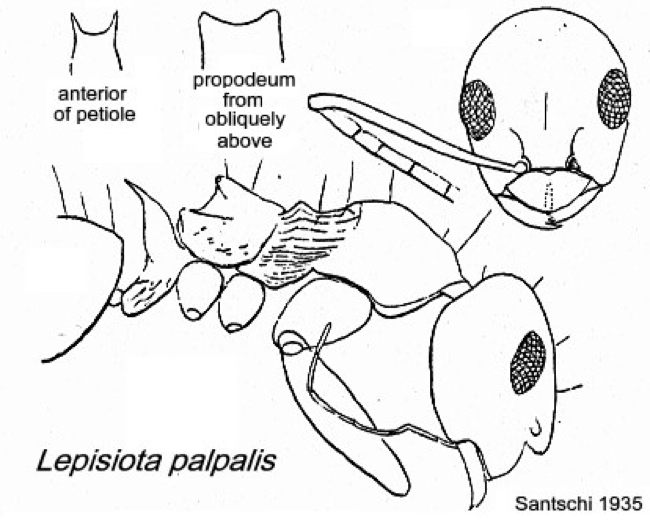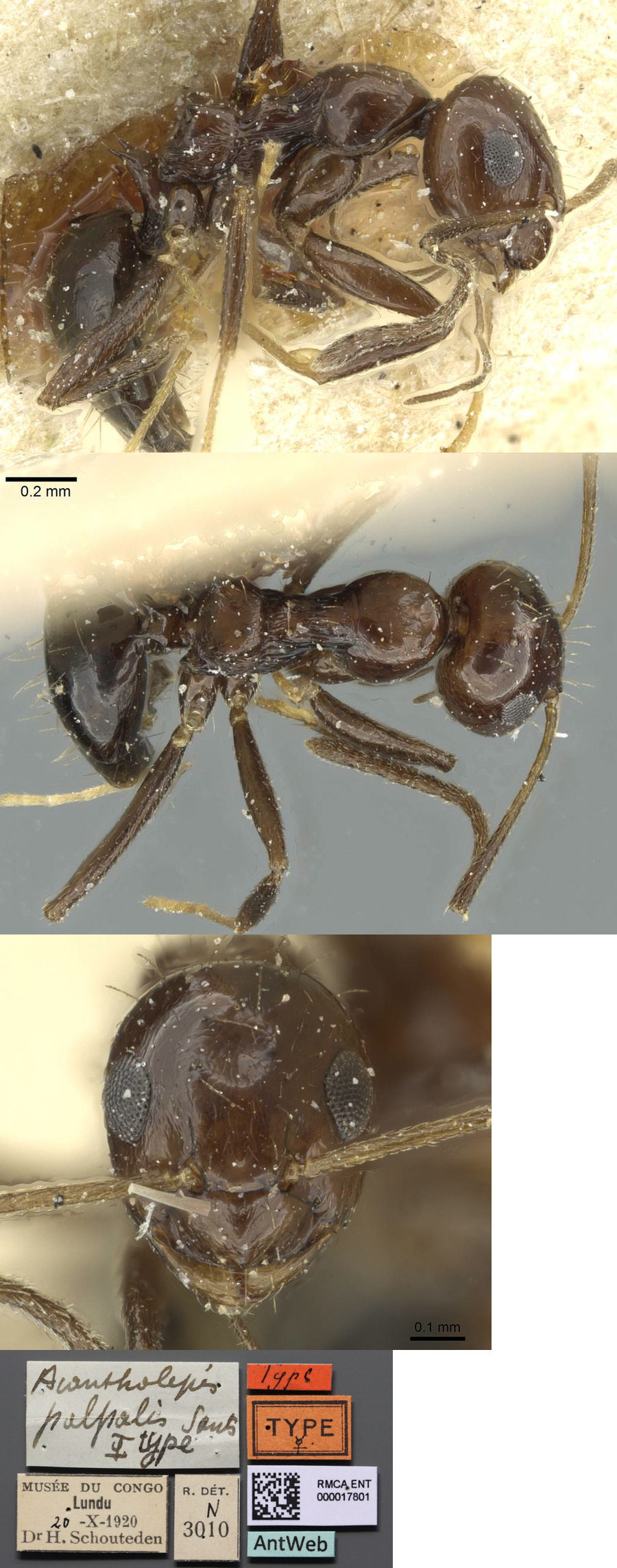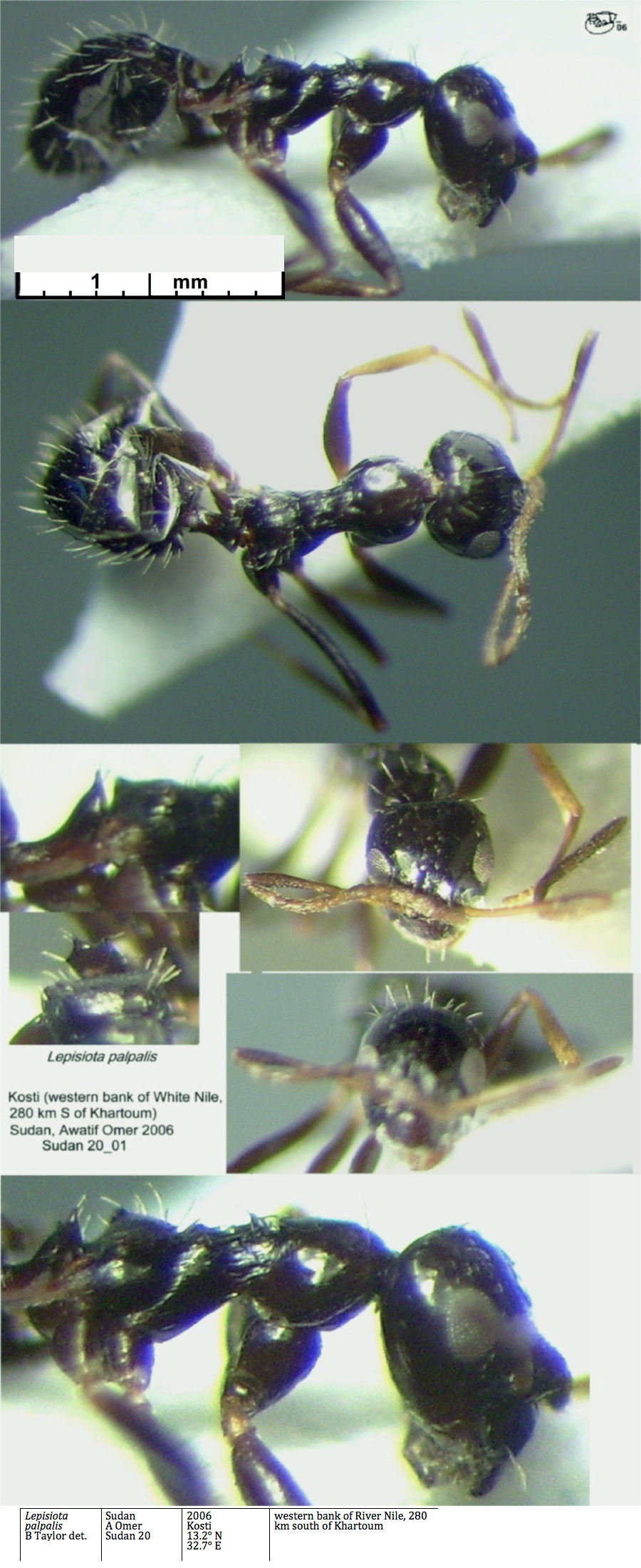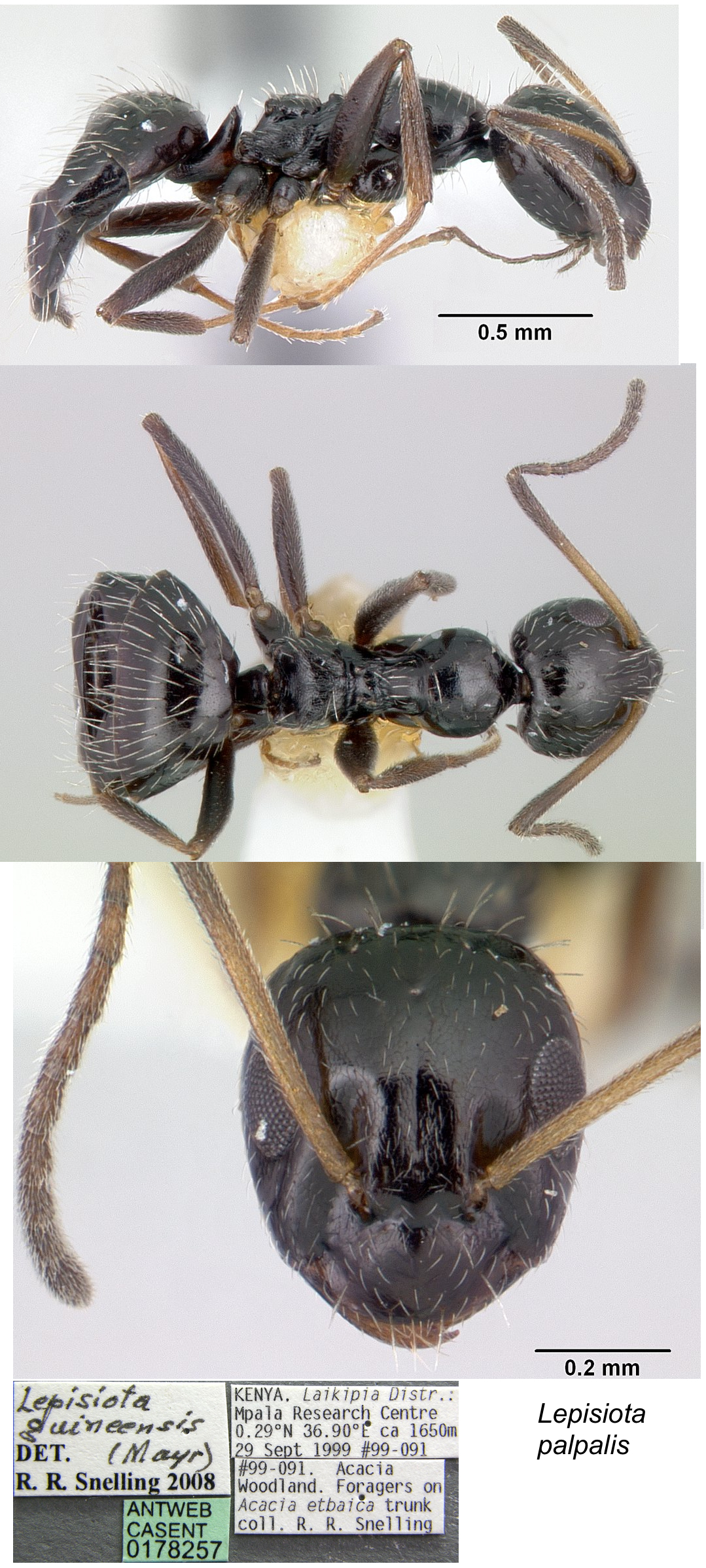Lepisiota palpalis (Santschi)
  Type location Zaïre
(Acantholepis palpalis n. sp., Santschi, 1935a: 276,
illustrated, worker), Lundu, 20.x.1920, Dr Schouteden; holotype worker
only Type location Zaïre
(Acantholepis palpalis n. sp., Santschi, 1935a: 276,
illustrated, worker), Lundu, 20.x.1920, Dr Schouteden; holotype worker
only  . .
|
 Santschi's (1935a) description is on Santschi's (1935a) description is on  . .
WORKER - TL 2-2.2 mm; colour brown black; gaster black; mandibles,
basal three-quarters of scape, trochanters and tarsi yellow brown; rest
of appendages medium brown. smooth and shiny; several strong
longitudinal rugae on sides of meso-metanotum; finer and partly
reticulate sculpture on lateral propodeum, metasternum and posterior
peduncle of petiole. Erect pilosity, yellow, long and spaced on body;
slightly oblique pubescence on appendages
Head oval, almost a third longer than wide; regularly rounded behind
the eyes. Eyes convex, as much as one third of sides of face; in full
face view, protruding beyond sides of face. Mandibles smooth. Clypeus
very convex and strongly carinate anteriorly. Postclypeal notch short.
Frontal carinae as long as the space between, divergent posteriorly.
Scape more than one-thirds past the occipital border. Funiculus segment
1 twice as long as wide and as long as segments 2 & 3 together.
Maxillary palps of remarkable length exceeding the head-thorax
junction. Pronotum depressed, profile as with depressa Santschi
(type location Kenya). Dorsum of mesonotum slightly higher than main
alitrunk axis, smooth close to anterior suture, where there is a small
tubercle with a long hair arising from it. Dorsum of propodeum also
slightly raised; lateral borders forming a slightly divergent rim (as
in ambigua, see above); tubercles slightly raised;
also similarly sized tubercles on the metasternum. Petiole scale higher
than length of posterior peduncle; summit narrowed, excavated and with
two spines, as long as the interval between their bases.
Grouped with excisa Forel
(type location unknown, not in Bolton, 1995, or Wheeler, 1922) and depressa
by the pronotum form but those are much more strongly sculptured and
matt; plus a more concave propodeum; the petiole scale of excisa
has similar spines but that of depressa is without
spines; the latter has elongated maxillary palps but not as long as in palpalis.
|
 The photomontage of the
type worker is collated from http://www.antweb.org/specimen.do?name=rmcaent000017801 The photomontage of the
type worker is collated from http://www.antweb.org/specimen.do?name=rmcaent000017801
|
Oxford University Museum
specimens
Lepisiota palpalis
B Taylor det.
|
Sudan
A Omer
Sudan 20
|
2006
Kosti
13.2° N
32.7° E
|
western bank of
River Nile, 280 km south of Khartoum
|
1
|
 |
Lepisiota palpalis
B Taylor det.
|
Sudan
Z Mahmoud
2009-34
|
Ar Rugayba
11°38'22.35" N
34°20'40.01" E
|
Hand collected
|
1
|
 |
Lepisiota palpalis
B Taylor det.
|
Sudan
J Mathews
JM 154
|
25.x.2000
Abu Gmein, Blue Nile
11°21' N
34°27' E
|
pyrethrum fogging of
Acacia senegal
|
1
|
 |
Lepisiota palpalis
B Taylor det.
|
Sudan
J Mathews
JM 174
|
25.xi.2001
Abu Gmein, Blue Nile
11°21' N
34°27' E
|
pyrethrum fogging of
Acacia senegal
|
2
|
 |
|
 The
photomontage is of a specimen from Sudan,
collected by J Mathews, by pyrethrum fogging of Acacia senegal;
Abu Gmein, Blue Nile, 11°21' N 34°27' E; JM 154;
25.xi.2000, 1 worker. The
photomontage is of a specimen from Sudan,
collected by J Mathews, by pyrethrum fogging of Acacia senegal;
Abu Gmein, Blue Nile, 11°21' N 34°27' E; JM 154;
25.xi.2000, 1 worker.
Head subsquare, with weakly concave occiput; clypeus
with quite a strong median carina/keel; eyes large (0.42 X length of
side of head) ovoid but shallowly convex; petiole profile moderately
narrowed but sharply tapered apically, bispinose; legs unusually long;
abundant erect yellowish pilosity (ca 0.12 mm long); shiny but
mesonotum and propodeum dull due to fine spiculation; dark brown
TL ca 2.9 mm, HL 0.70, HW 0.62, CI 91, SL 0.77, SI 127, PW 0.42
This form looks very close to the Santschi image and description but is
bigger,
|
 The
photomontage is of a worker from Sudan,
collected by J Mathews, by pyrethrum fogging of Acacia senegal;
; Abu Gmein, Blue Nile, 11°21' N 34°27' E; JM 174;
25.xi.2000, 1 worker, 2 workers. The
photomontage is of a worker from Sudan,
collected by J Mathews, by pyrethrum fogging of Acacia senegal;
; Abu Gmein, Blue Nile, 11°21' N 34°27' E; JM 174;
25.xi.2000, 1 worker, 2 workers.
Small, long palps distinctive; head in full face view near circular;
eyes large (0.43 x length of side of head); pronotum dorsally
flattened; propodeum dorsum with a weak longitudinal septum; petiole
bispinose; abundant fine erect yellow pilosity (on gaster ca 0.12 mm
long); shiny unsculptured, except lateral mesonotum and propodeum which
are very finely spiculate; chestnut to dark brown; antennae wholly
yellow brown except for apical segments of funiculus
TL ca 2.5 mm, CI 80, SI 138
Abu Gmein, JM 174 1 tree (5) - rather more brown than others from Sudan.
|
 The
photomontage is of a specimen from Sudan,
from Kosti, western bank of River Nile, 280 km south of Khartoum,
collected by Awatif Omer, 2006, Sudan 20_01. NOTE - when viewed with
head tilted slightly back and mandibles exposed the head shape is
ovoid, in full face view the occiput is seen to be straight. The
petiole clearly has the posteriorly curved spines shown in Santschi's
drawing. The
photomontage is of a specimen from Sudan,
from Kosti, western bank of River Nile, 280 km south of Khartoum,
collected by Awatif Omer, 2006, Sudan 20_01. NOTE - when viewed with
head tilted slightly back and mandibles exposed the head shape is
ovoid, in full face view the occiput is seen to be straight. The
petiole clearly has the posteriorly curved spines shown in Santschi's
drawing.
TL ca 2.2, HL 0.55, HW 0.48, CI 88, SL 0.61, SI 127, PW
0.32
|
The photomontage is collated from http://www.antweb.org/specimen.do?name=casent0178257&shot=p1&project=kenyaants,
where appears as Lepisiota guineensis
 |
|